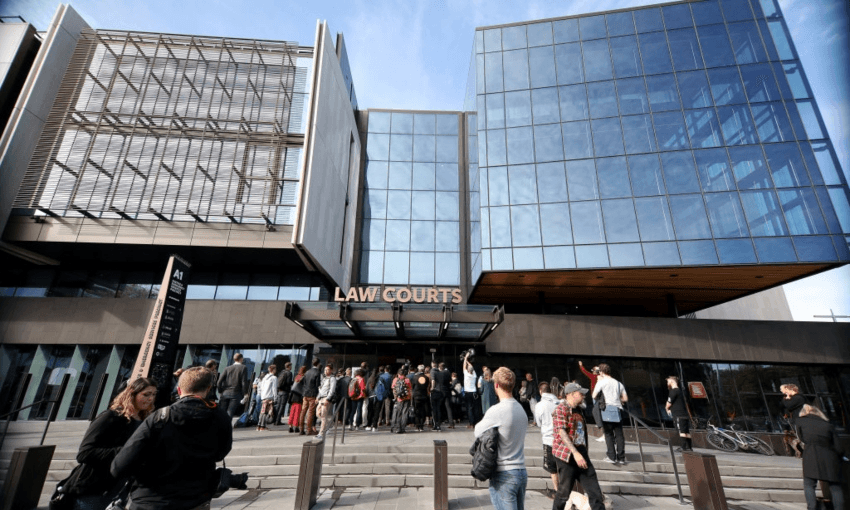The upcoming trial of a man accused of carrying out the Christchurch mosque shootings will be unprecedented in New Zealand law. To get your head around the process, legal expert Graeme Edgeler casts his eyes over some of the most pressing questions New Zealanders are asking about how it will happen.
What charges will the accused face?
Each death will be charged as a murder. There will be an individual charge for each death, but, of course, all charges will be dealt with at a single trial.
Won’t the prosecution be deciding between charging the death as murders or as terrorism?
No. The deaths will be prosecuted as murders. It is possible that there may be terrorism charges as well, but the individual deaths will be charged as murders. The main reason for this is that murder is a more serious charge. Indeed, it is the most serious charge we have.
Don’t murder and terrorism have the same maximum penalty?
No. While the maximum penalty for both murder and terrorist act is life imprisonment, when a judge is sentencing someone for murder, they have greater discretion in the minimum period of imprisonment (sometimes called the non-parole period).
A life sentence for a terrorist act charge has an automatic 10-year minimum period of imprisonment. A judge is not permitted to impose a longer minimum period of imprisonment.
When a life sentence is imposed for a murder conviction, the judge has options. For particularly bad murders (including those arising from a terrorist act) the judge must set a minimum period of imprisonment of at least 17 years, and is permitted to impose an even longer one in appropriate circumstances. To date, the longest sentence imposed for a murder has been a life sentence with a minimum period of imprisonment of 30 years.
Following a 2010 law change, a judge sentencing someone for murder even has the option of ordering a life sentence be served without the possibility of parole. This has not yet happened, but is a real possibility when there are so many victims.
What about preventive detention, can’t a court impose that to keep someone in prison forever?
Preventive detention is fundamentally no different from a life sentence. While they are imposed for different things, once they are imposed, the operate the same way in prison. People sentenced to preventive detention also have minimum periods of imprisonment, and once they have served these can be considered for parole and potentially released.
Preventive detention cannot be imposed without the possibility of parole, and is not available as a sentence for either murder or terrorism.
Are other charges possible?
Yes. Attempted murder charges may be pursued in respect of those victims who, thankfully, were not killed.
Attempted murder charges could be brought in respect of some of those who were present, but who were not physically injured, but this is probably unlikely.
The maximum penalty for attempted murder is 14 years imprisonment. Because it is a serious violent offence that doesn’t carry a life sentence, preventive detention would be available as a sentence if there are convictions for attempted murder.
I understand there may already be a charge relating to the live-streaming the attack. Other charges are possible as well.
Could there be terrorism charges as well?
Yes. While individual victims will have distinct charges, overarching terrorist act charges are also possible, or even likely.
I would anticipate perhaps two terrorist act charges, one for the attack at Masjid Al Noor, and a second for the attack at the Linwood Masjid, but there are other options open to the Crown.
It is possible the Crown will decide murder charges are sufficient, but I anticipate that they will consider that the events call for terrorist act charges to recognise the harm done to victims who will not have individual charges, and for the wider effect of the Muslim community and others.
Charges relating to what Police have called IEDs are also possible, either as charges of terrorist bombing (maximum life sentence, with 10 years non parole, or attempted terrorist bombing (maximum 14 years imprisonment). There isn’t enough public information about these to be able to assess the likelihood of such charges.
How will the trial take place?
Unless the accused pleads guilty, or is found unfit to stand trial, or insane, the trial will be a High Court jury trial. Judge-alone trials are not possible for offences this serious.
Will the trial be held in public?
Yes. Criminal trials are held in public in New Zealand. It is possible that the public may be excluded from some of the evidence (although I think this is unlikely), but even if that were to happen, news media would still be permitted to be present.
While future pre-trial preliminary matters are likely to occur with the accused appearing via video link, for the trial itself, he will be entitled to be present in court if he wishes.
What about suppression?
The accused does not have name suppression. Parts of the evidence may be suppressed (that is, they will be heard in open court, but news media won’t be able to report what was said), but the law limits the types of suppression orders that are allowed.
Concerns about giving publicity to someone who sought notoriety through an abhorrent act are largely matters of journalistic ethics. The Court will have some impact, for example, it can refuse permission to film all or parts of the trial, and can place limits on the use of in-court footage. However, the regulation of news media in New Zealand is largely a matter for Media Council and Broadcasting Standards Authority, not for the courts.
